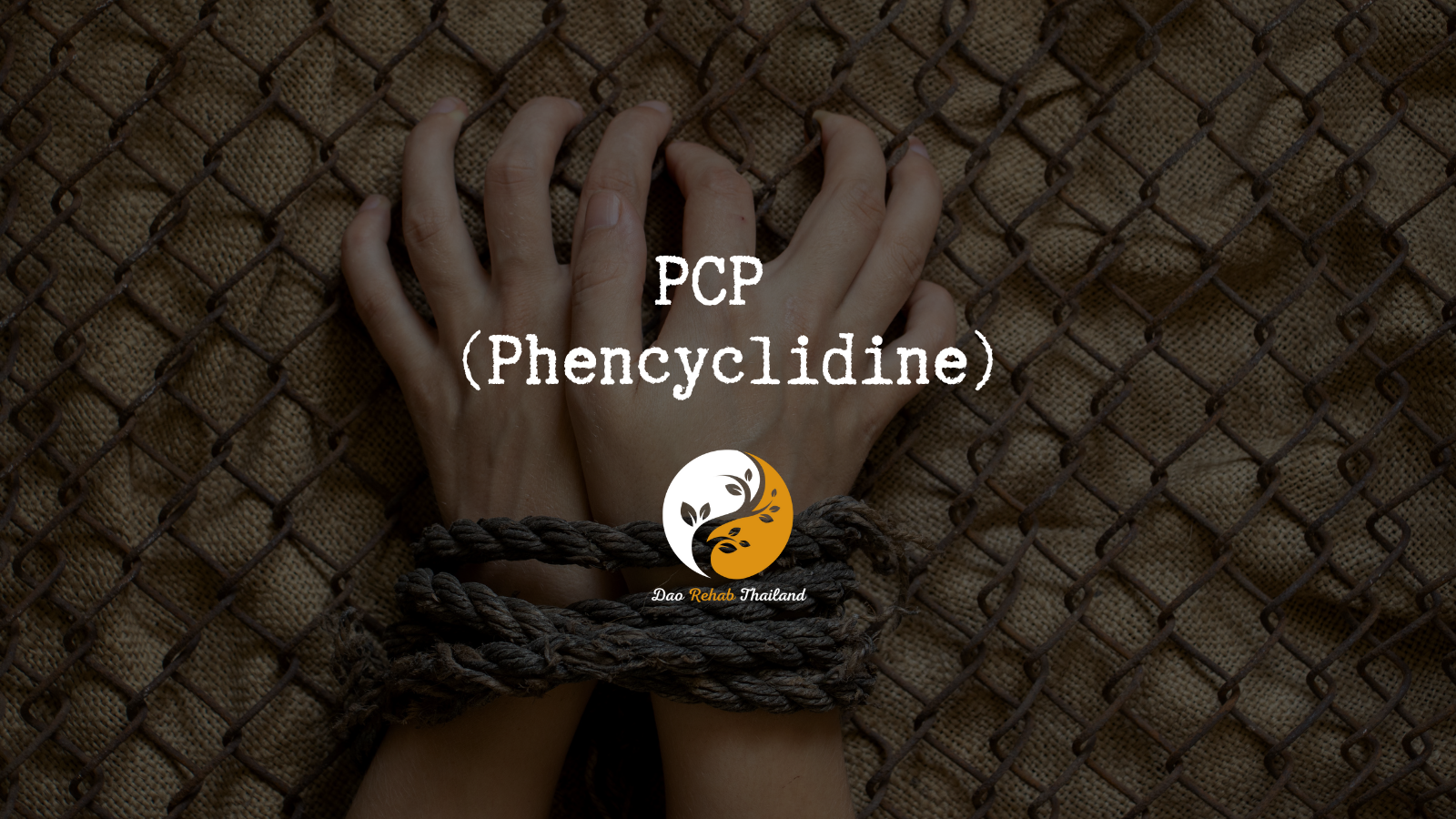
PCP-Phencyclidine holistic center in thailand
PCP (Phencyclidine)
“Turning the impossible into possible”

"Detox from PCP (Phencyclidine) at a Luxury Holistic Center in Thailand and Israel"

Detox from PCP (Phencyclidine)
PCP (Phencyclidine), also known as “Angel Dust,” is a hallucinogenic drug that began as a pharmaceutical substance. Initially, PCP was developed in the 1950s for use as an anesthetic, but due to severe side effects observed in humans, such as hallucinations, paranoia, and psychotic reactions, its medical use was discontinued, and it transitioned to the illicit market as a psychoactive drug.
"Holistic Center for Trauma, Addiction, and Mental Imbalance Treatment in Thailand"
“Come to the beginning of your journey to freedom from addiction to alcohol, drugs, and pills, and rediscover your life within the serene embrace of DaoTherapy Rehab in Thailand—where holistic healing meets empowering recovery.”
DaoTherapy Holistic Rehab
Key Elements of PCP (Phencyclidine) Detox:
Medical Supervision: OxyContin detox must be conducted under medical supervision, as the body may experience withdrawal symptoms. These can include nausea, anxiety, muscle aches, and insomnia. A medical team will monitor and manage these symptoms to ensure the patient’s safety and comfort.
Holistic Therapies:
Holistic Therapies: Many detox programs incorporate holistic therapies such as mindfulness, yoga, and meditation to help individuals cope with stress and anxiety during the detox process. These therapies support the mind-body connection and contribute to overall recovery.
Tapering Process
Tapering Process: PCP (Phencyclidine) detox often involves a gradual tapering of the drug to reduce withdrawal severity. Doctors will slowly decrease the dosage over time to allow the body to adjust to lower levels of the substance.
Psychological Support:
Psychological Support: Like any addiction recovery process, detox from PCP (Phencyclidine) includes psychological support. This can involve counseling, therapy, or support groups to address the mental and emotional aspects of addiction.
Post-Detox Treatment:
Post-Detox Treatment: After completing detox, continuing treatment is crucial to prevent relapse. This often includes participation in ongoing therapy, group support, and the development of new coping strategies to maintain sobriety.
Characteristics and Effects:
Characteristics and Effects:
1. Mental Effects:
- Hallucinations: PCP causes intense hallucinations that are often frightening and disrupt the user’s perception of reality.
- Sense of Detachment: Users may experience a feeling of detachment from their body and reality, leading to dissociative-like experiences.
- Paranoia: A common side effect of PCP use is paranoia and a sense of being pursued or threatened.
2. Physical Effects:
- Loss of Pain Sensation: PCP can dull pain perception, potentially leading to dangerous and unpredictable behavior.
- Coordination Impairment: PCP affects the central nervous system, resulting in impaired coordination.
- Increased Blood Pressure and Rapid Heartbeat: Prolonged use can lead to cardiovascular issues and high blood pressure.
3. Addiction and Dependence:
- Psychological Dependence: Repeated use of PCP can lead to psychological dependence as the user seeks the euphoric and hallucinogenic experience the drug provides.
- Withdrawal Symptoms: These may include depression, anxiety, and irritability.
Risks and Side Effects:
- Psychotic Reactions: PCP can lead to violent outbursts and severe psychotic reactions, even after a single use.
- Memory and Cognitive Impairment: Long-term use of PCP can result in memory loss, attention issues, and impaired cognitive abilities.
- Long-Term Effects: In some cases, psychotic side effects can persist long after discontinuing the drug.
Summary: PCP is a dangerous drug with severe mental and physical effects. Its use leads to hallucinations, a sense of detachment, and paranoia, along with risks of unpredictable behavior and psychotic reactions. Raising awareness of the dangers of PCP use and providing support and treatment for those struggling with addiction to this drug is essential.

contact us
Contact us with your questions
We would love to speak with you! Feel free to reach out with any questions.

get in touch
Schedule a free consultation
Schedule a free consultation with our team and let’s make things happen!
Risks of Using PCP (Angel Dust):
Risks of Using PCP (Angel Dust):
Using PCP involves significant risks, both short-term and long-term, with potentially severe physical and psychological consequences. Here is a detailed overview of the main risks associated with this drug:
1. Physical Risks:
– Loss of Pain Sensation: PCP can suppress the sensation of pain, leading to dangerous behavior where the user may harm themselves without feeling the injury.
– Coordination Impairment: The drug affects the central nervous system, resulting in impaired movement coordination and stability.
– Cardiovascular Issues: Prolonged use can lead to increased blood pressure and rapid heartbeat, raising the risk of heart problems.
– Respiratory Changes: High doses of PCP can cause respiratory depression and, in extreme cases, death.
2. Psychological Risks:
– Psychotic Reactions: PCP use can result in hallucinations, paranoia, and delusional thinking. In severe cases, users may experience violent psychotic episodes.
– Paranoia and Aggression: The drug often induces feelings of persecution and aggression toward others, leading to unpredictable and dangerous behavior.
– Psychological Dependence: Regular use can lead to psychological addiction, with users repeatedly seeking the euphoric and dissociative effects of the drug.
3. Long-Term Side Effects:
– Memory and Cognitive Impairment: Long-term use can damage memory and cognitive abilities, even after stopping the drug.
– Depression and Anxiety: Mental health symptoms following use can include severe depression and anxiety, sometimes requiring long-term psychological treatment.
– Relationship Strain: Users may become estranged from family and friends due to erratic and aggressive behavior.
4. Risk of Death:
– Overdose: High doses can lead to overdose, which in some cases may result in severe respiratory depression and death.
– Accidents and Injuries: Due to the loss of pain sensation and coordination issues, users are at risk for accidents and self-inflicted injuries.
PCP is a dangerous drug with serious physical and psychological risks. It can cause hallucinations, paranoia, aggression, memory impairment, and depression, threatening the user’s health both in the short and long term. Raising awareness of the risks and using appropriate support and treatment frameworks are essential for dealing with addiction to this drug and preventing its destructive effects.
Withdrawal Symptoms from PCP (Angel Dust):
Withdrawal Symptoms from PCP (Angel Dust):
The withdrawal process from PCP is complex and accompanied by both physical and psychological symptoms. Although the withdrawal symptoms from this drug may be less severe than those from other drugs like opioids, they can still be challenging and require treatment and support. Here is an overview of the main symptoms:
1. Physical Symptoms:
– Extreme Fatigue: Persistent exhaustion is a common symptom during PCP withdrawal.
– Muscle and Joint Pain: Users may experience body and joint pain.
– Sweating: Excessive sweating is part of the withdrawal process.
– Tremors: Shaking, especially in the hands, may occur during withdrawal.
2. Psychological Symptoms:
– Anxiety: Increased anxiety that may worsen during withdrawal.
– Depression: Severe depression, feelings of hopelessness, and sadness are common.
– Irritability and Restlessness: Difficulty relaxing and general restlessness.
– Craving for the Drug: A strong desire to use PCP again to alleviate psychological symptoms.
3. Severe Psychological Symptoms:
– Hallucinations and Perceptual Changes: In some cases, users may continue to experience mild hallucinations or changes in perception even after stopping use.
– Confusion and Detachment: Users may feel confused and disconnected from reality.
– Concentration Problems: Difficulty focusing and mental confusion.
4. Sleep Issues:
– Insomnia: Difficulty falling asleep or irregular sleep patterns, leading to increased fatigue.
– Nightmares: Unpleasant dreams and nightmares may occur during withdrawal.
Duration of Withdrawal:
Withdrawal symptoms can last from a few days to several weeks, depending on the extent of use and the duration of exposure to PCP. Some psychological symptoms, such as depression and anxiety, may persist longer and require prolonged professional treatment.
Managing Withdrawal:
The withdrawal process from PCP should ideally be conducted with appropriate medical and psychological supervision. Medical treatment can help alleviate physical symptoms, while psychological support can assist with handling mental and emotional challenges. Support from family, friends, and support groups can also contribute to the recovery process.
PCP withdrawal involves challenging physical and psychological symptoms that require professional management and support. Proper treatment and adequate support can help individuals undergo withdrawal safely and avoid relapse.
Psychological Damage from Using PCP (Angel Dust):
Psychological Damage from Using PCP (Angel Dust):
PCP use can result in significant, and sometimes irreversible, psychological damage. The mental effects of the drug stem from its impact on the brain and central nervous system, and they often worsen with prolonged use or high doses. Here is an overview of the main psychological damage associated with PCP use:
1. Psychotic Reactions:
– Hallucinations and Delusions: PCP can cause visual and auditory hallucinations and delusions that may persist long after discontinuing use. These hallucinations can be threatening and induce severe fear.
– Development of Chronic Psychosis: Long-term use of PCP can lead to chronic psychosis, characterized by a detachment from reality and an inability to differentiate between reality and imagination.
2. Paranoia and Aggression:
– Persecution Delusions: Users may develop severe paranoia, accompanied by feelings of being pursued and heightened suspicion of others. This feeling can lead to violent and aggressive behavior.
– Aggressive Reactions: The effects of the drug can trigger uncontrolled and aggressive behavior, endangering both the user and those around them.
3. Mood Disorders:
– Depression: Continued PCP use can lead to severe depression, characterized by hopelessness, deep sadness, and loss of interest in previously enjoyable activities.
– Increased Anxiety: Users may experience intense anxiety attacks, and sometimes develop generalized anxiety disorder.
– Extreme Mood Swings: Users may experience rapid and unpredictable mood swings, fluctuating from agitation to calm, making normal daily functioning difficult.
4. Memory and Cognitive Impairment:
– Short-Term Memory Issues: PCP use impairs short-term memory, leading to difficulties in performing daily tasks and maintaining a normal routine.
– Reduced Cognitive Function: Users may have trouble with coherent thinking, problem-solving, and handling complex tasks.
5. Psychological Dependence:
– Mental Dependence: The powerful effect of PCP on feelings of euphoria and dissociation from reality leads to strong psychological dependence. This manifests as a strong craving for repeated use, even after prolonged abstinence.
– Challenges in Withdrawal: Withdrawal symptoms include feelings of depression, anxiety, and irritability, making the withdrawal process difficult and often leading to relapse.
PCP use results in severe psychological damage, including paranoia, psychosis, mood disorders, memory impairment, and psychological dependence. These damages can persist even after stopping the drug and significantly impact quality of life. Professional treatment and appropriate support are critical to addressing the psychological damage and aiding in recovery.
Psychological Support:
Psychological Support: Like any addiction recovery process, detox from Subutex includes psychological support. This can involve counseling, therapy, or support groups to address the mental and emotional aspects of addiction.








